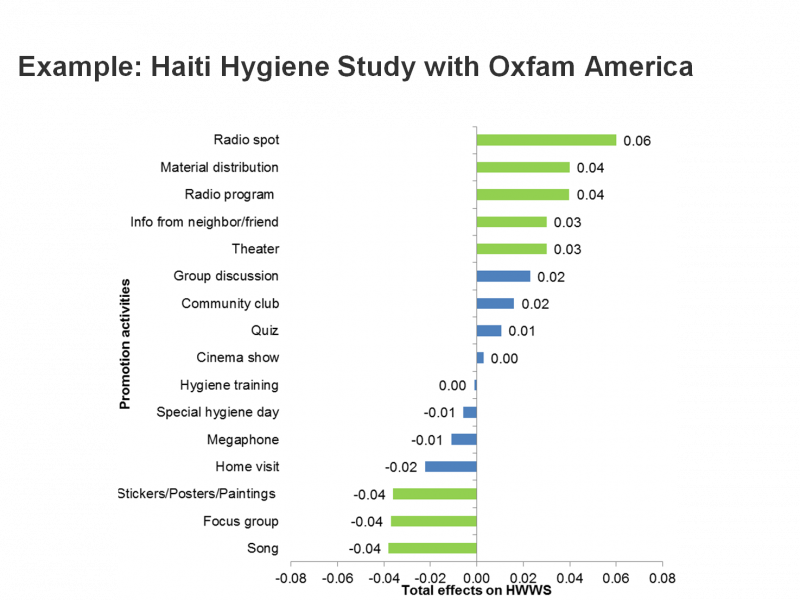- Forum
- categories
- Attitudes and behaviours
- Behaviour change and user psychology issues
- Let's get the psychologists interested in sanitation and behaviour change
Let's get the psychologists interested in sanitation and behaviour change
6578 views
- Elisabeth
-
Topic Author
- User is blocked
- Freelance consultant since 2012
Less- Posts: 3372
- Karma: 54
- Likes received: 932
Re: Let's get the psychologists interested in sanitation and behaviour change
++++++++++++++++++++
Dear Hansi,
I was just wondering what you think of SaniFOAM and how it relates to your own work? The title sounds similar to what you are trying to do, so I am a bit curious:
Devine, J. (2009). Introducing SaniFOAM: A framework to analyze sanitation behaviors to design effective sanitation programs - Global scaling up sanitation project. World Bank, Water and Sanitation Program (WSP), USA.
www.susana.org/lang-en/library?view=ccbktypeitem&type=2&id=1448
Regards,
Elisabeth
+++++++++++++++
His reply:
Dear Elisabeth,
yes, we can use this discussion for the forum (I am now member).
I know the SaniFoam approach quite well and I have discussed it in my RANAS-Model article. I very much appreciate the introduction of psychology into the field and its combination with the marketing mix.
Nevertheless, the approach has several shortcomings:
1. Psychological factors are not transposed according to theory. This has the consequence that the approach does not use the behavioral determinants developed and proved in a great many of experiments which were peer reviewed.
2. There is no reasoning about how the factors were assigned to the FOAM blocks. Examples: In psychology social norms are considered as a motivational factor. Intention represents exactly the motivation.
3. Self-regulation factors are not considered. People can be motivated but fail to overcome distractions and barriers. Moreover they have to recall the behavior in the right moment.
4. There is no instruction about how to measure the behavioral factors in a target population, consequently there is no instruction about how to determine the most important factors which should be changed in a certain case.
5. The approach does not establish a relationship between behavioral factors and corresponding behavior change techniques.
Concluding, I think the approach is useful by introducing psychological thinking but there are some important elements missing.
Best regards, Hans Mosler
_ _ _ _ _ _ _ _ _ _ _ _ _ _ _ _ _ _ _ _ _ _
Prof. Dr. phil. et dipl. zool.
Hans-Joachim Mosler
Eawag
Department of System Analysis,
Integrated Assessment and Modeling (SIAM)
Überlandstrasse 133
P.O. Box 611
CH-8600 Dübendorf
Switzerland
sozmod.eawag.ch/team.php
www.eawag.ch
Freelance consultant on environmental and climate projects
Please Log in to join the conversation.
You need to login to reply- christian.rieck
-

- Moderator
Less- Posts: 118
- Karma: 7
- Likes received: 41
Re: Let's get the psychologists interested in sanitation and behaviour change
The Kampala study will be very interesting to follow.
Christian
Enhanced Water Security and Sanitation (ENWASS)
Sanitation for Millions
This email address is being protected from spambots. You need JavaScript enabled to view it.
Attachments:
-
 HaitislideMosler.png
(Filesize: 253KB)
HaitislideMosler.png
(Filesize: 253KB)
Please Log in to join the conversation.
You need to login to reply- Elisabeth
-
Topic Author
- User is blocked
- Freelance consultant since 2012
Less- Posts: 3372
- Karma: 54
- Likes received: 932
Let's get the psychologists interested in sanitation and behaviour change
I want to try and share with you what I learnt on that day:
He showed us how the factors determining whether behaviour is changed or not can be scientifically measured with tools that psychologists use. He said most of the time we just "shoot with a shot gun and hope for the best" but we don't really know how to target our behaviour change interventions so that they are actually successful. He explained to us how with carefully-designed upfront research and questionnaires, you can identify those kinds of interventions which will work best (in terms of behaviour change) for a given context.
He also said that not enough psychologists are working in development cooperation yet. Which is strange, as it should be such a fascinating field for them to work in!
Do we have any psychologists in our group here? Would they like to add to this?
I am really curious to learn what Prof. Mosler will find out and publish in the future - right now he is involved in research in Kampala on sanitation in slums. Here they want to focus on toilet cleaning as that seems to be the biggest factor which stops people from wanting to use (shared) toilets (i.e. dirty toilets).
Here you can read more:
His full presentation:
www.susana.org/lang-en/library?view=ccbktypeitem&type=2&id=1324
Summary of the presentation:
How can it be achieved that water and sanitation facilities will be actually used by the population?
This presentation shows how to change behavior of the general public to use new or different "hardware" by using specific behaviour change techniques. A sound psychologically based, quantitative assessment of behavior determinants is presented. This assessment helps to identify those behavioural determinants which need to be changed as a priority, and the selection of corresponding behaviour change techniques. The developed protocol aims at having reliable and sustainable evidence-based behaviour change interventions and programmes.
Some preliminary results from the research in Kampala:
www.susana.org/lang-en/library?view=ccbktypeitem&type=2&id=1281
And some of the most important slides:
Maybe my team mates who attended this presentation as well would like to add their learnings? Or others who have been confronted with these ideas before?
I look forward to hearing from you.
Regards,
Elisabeth
Freelance consultant on environmental and climate projects
Attachments:
-
Folie1.JPG (Filesize: 33KB)
-
Folie2.JPG (Filesize: 34KB)
-
Folie3.JPG (Filesize: 60KB)
-
Folie4.JPG (Filesize: 39KB)
-
Folie5.JPG (Filesize: 43KB)
-
Folie6.JPG (Filesize: 37KB)
-
Folie7.JPG (Filesize: 59KB)
Please Log in to join the conversation.
You need to login to reply- Forum
- categories
- Attitudes and behaviours
- Behaviour change and user psychology issues
- Let's get the psychologists interested in sanitation and behaviour change







